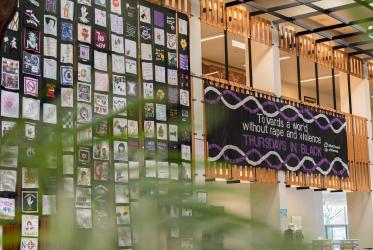The United Church of Christ (UCC)—and you personally—have been actively involved in Thursdays in Black for some time. What made the UCC initially join the movement, and what might you hope to highlight as an ambassador?
Dr Thompson: The United Church of Christ has a long history of engagement in justice issues at the local and global levels. In 2014, I was drawn to the Thursdays in Black campaign and its simple yet profound invitation and commitment to raising awareness and advocacy for preventing gender-based violence. The UCC actively started participating in Thursdays in Black in 2016, when staff started gathering weekly to take a picture and to post on our social media pages. We also placed a story in our UCC news and brought the campaign to the General Senate in 2015, bringing it some additional exposure along the way.
As an ambassador, my hope is to see the United Church of Christ and the global ecumenical community continue in its efforts to advocate for a just world for all, with the inclusion of the rights of women and girls whose lives are disproportionately interrupted by gender-based violence.
In the last several years, the revelations of sexual abuse involving high profile personalities, as well as movements such as #MeToo, have significantly raised awareness of gender-based violence. What does Thursdays in Black add to these high-profile campaigns?
Dr Thompson: The Thursdays in Black campaign certainly is a part of a global community raising awareness and advocacy around gender-based violence. Other movements such as #MeToo have brought additional attention to the silence, to the severity, and to the widespread nature of gender-based violence. #MeToo and the exposure of high-profile personalities, who have been victims and perpetuators of gender-based violence, point to the need for engagement on every level of society—because gender-based violence is no respecter of persons or economies.
Gender-based violence affects millions of women, some of whom do not have the capacity, or the capability to advocate for themselves because of the tenuous situations in which they are living, or the laws of the countries in which they reside. Thursdays in Black adds the voices of the church, of marginalised women, to the voices that have already been raised in some of these high-profile campaigns, and brings a wide range of voices to the cry for justice, for the elimination of gender-based violence.
What can churches be doing in the midst of the response to COVID-19, to address the reported rise in violence in the homes, and to work for a post-COVID vision of a world without rape and violence?
Dr Thompson: As we move through this time of pandemic and sheltering in place, people are spending more time together in stressful situations. This has alerted advocacy groups globally to the need for increased awareness and the need to be prepared for increases in incidences of sexual and gender-based violence because of the close proximities in which people are being asked to stay over an extended period of time. We're also aware in the midst of the pandemic, that there has also been an increase in violence against Indigenous women and against transgender persons.
COVID-19 continues to expose the fault lines among us. The world is seeing gender-based violence in a new context. Churches must be willing to voice their concerns for women and girls and all who are exposed to and are victims and survivors of gender-based violence. The call of the Ecumenical Women at the UN to “pause, pray, post and pledge” is a strategy that invites participation from the churches to raise awareness while connecting with a global movement and also encourages them to highlight the issues that are in their own communities.
Our partnerships in the United Church of Christ with Ecumenical Women at the UN, the WCC, and other denominations and organisations globally, provide a visible, tangible witness and support for the human rights of women and girls. Churches need to be a part of the awareness, and be places of safety and advocacy, as we continue to shelter in place and move towards a world that is free from rape and violence.
Thursdays in Black Ambassadors
“Ambassadors” lead Thursdays in Black Solidarity (WCC Press release of 5 September 2019)


